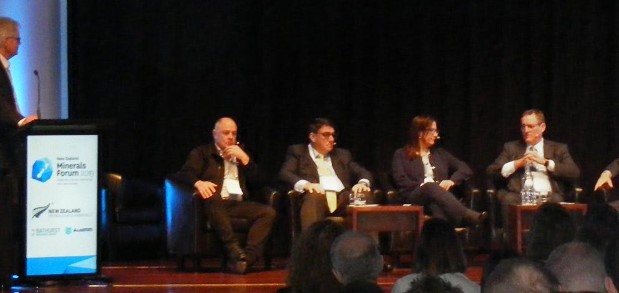Under pressure to deliver
By Simon Hartley

No shortage of issues being considered by the mining sector; (from left), standing, Straterra chief executive Chris Baker, Bathurst Resources chief executive Richard Tacon, McGagh Advisory director John McGagh, Anderson Lloyd environmental lawyer Maree Baker-Galloway, Oceana Gold chief executive Mick Wilkes and Tasman Mining managing director Mark Le Messurier. PHOTO: STAFF PHOTOGRAPHER
New technology in the mining sector might be the answer to transitioning away from fossil fuel use, but the industry is coming under increasing scrutiny to deliver.
Protesters outside Dunedin’s town hall yesterday wanted “change now”, while inside the annual Minerals Forum conference, talk of transitioning ranged from steps in the next few years to decades.
Oceana Gold chief executive Mick Wilkes said the sector had to “exceed society’s expectations”, believing Oceana’s “social licence” of operating mines in New Zealand, the Philippines and the US was among the top three in the world.
The use of technology at Macraes in East Otago meant that mine was a “benchmark for efficiency”.
The now closed Reefton mine was a “showpiece” of what can be achieved post-mining with remediation, as had the widespread tree-planting at the Philippine mine, part of a multimillion-dollar strategy.
However, the industry is stinging from Conservation Minister Eugenie Sage having denied permission for Oceana to build a new tailing pond at Waihi, in the central North Island.
Mr Wilkes, who believes Waihi could have decades of work ahead, said without the dam the mine could close in five to eight years.
“We’ll have to close down,” he said.
“Investors see this, it’s not a good thing … it doesn’t bode well for New Zealand mining,” Mr Wilkes said.
That decision also prompted West Coast gold mining junior Advent Gold to put off a sharemarket listing for a year, until the “geopolitical situation settled”.
Bathurst Resources chief executive Richard Tacon said companies should “never stop repackaging”, with a focus on sustainability and energy use.
He said with New Zealand coking coal “highly sought after”, there was a place for its export, offset by its use replacing some thermal coal.
“Transitioning is scary for everyone, employers and the community … [but] we have to set the timetable,” he said.
CRL Energy chairman Alan Broome said in a separate lecture there were three large underground coal deposits on the West Coast, which new automated machine technologies could access; although costs would determine feasibility.
McGagh Advisory director John McGagh said Norway, which has reaped huge financial benefits from decades of oil and gas discovery and production, was now “looking for life beyond oil”.
The use of data collation, drones, and automated machinery with above-ground operators were lecture themes.
Anderson Lloyd environmental lawyer Maree Baker-Galloway said the Resource Management Act was now “inefficient” and she believed its review would see it broken up, while the Conservation Act was “no longer fit for purpose”.
Tasman Mining managing director Mark Le Messurier, who is looking to raise $40million in the coming year to go underground near Reefton, said the future focus had to be training, and the use of technology, and education.
“There’s not enough enrolments in universities. We won’t have the managers or leaders we need,” he said.
Source: Otago Daily Times

